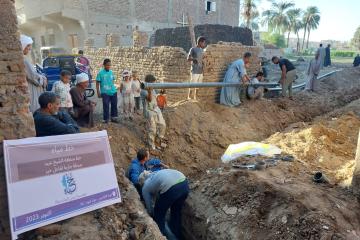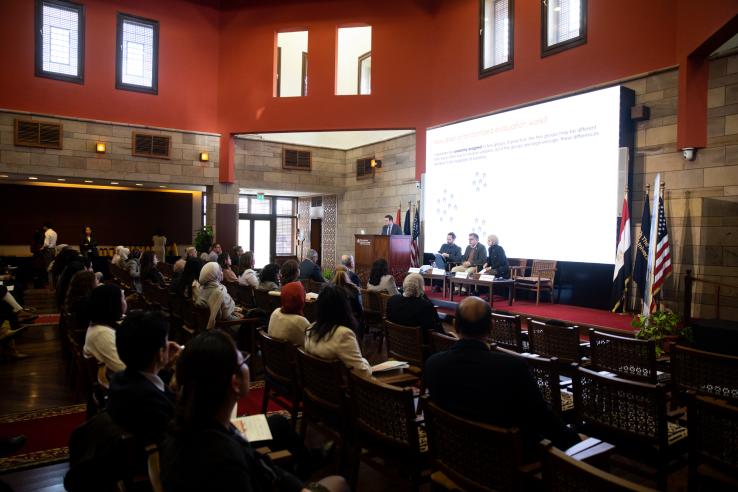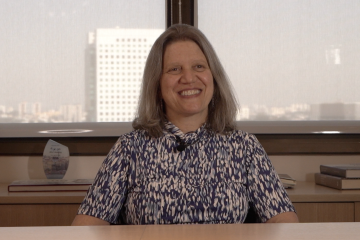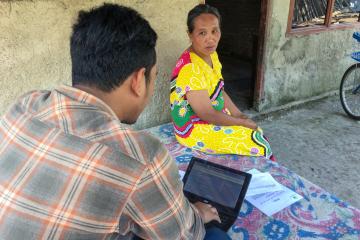
20 for 20: Bringing global evidence to drive change for child and adolescent wellbeing in Egypt with UNICEF

This is the seventh post of J-PAL’s 20 for 20: Partner Voices blog series, where we showcase stories of results and impact with our partners to celebrate our twentieth anniversary. Read on to learn how J-PAL Middle East and North Africa’s (MENA) partnership with UNICEF Egypt helps bring greater use of evidence on policies that impact Egypt’s children and their families.
At UNICEF Egypt, we use evidence to drive change and show us how far we have come in making children happier and safer—and how many are left behind.
This year, I am personally delighted to celebrate four years of partnership with the Abdul Latif Jameel Poverty Action Lab Middle East and North Africa (J-PAL MENA). I have seen this partnership start and grow over the years. It brought together over 500 people from Egypt’s government, development organizations, civil society organizations and J-PAL affiliated researchers.
Throughout the past years, stakeholders have come together to discuss pertinent policy issues affecting children and adolescents in Egypt and to explore possible policy solutions. Seven seminars and briefs on thematic areas that are key to children in the country were developed, including youth unemployment, education systems, shock responsive social assistance, gender and social norms, fertility and family planning, early childhood development, and climate change.
During each seminar, policymakers highlight a particular development priority in Egypt. J-PAL affiliated researchers frame the priority from a global perspective and offer evidence-informed insights for improving policy and program design. In dialogue, the panel of policymakers, UNICEF, development partners and J-PAL affiliated researchers ground the evidence in the Egyptian context.
The value of researchers working with policymakers for greater impact
Over the past years, there has been a noticeable shift by the government of Egypt toward more evidence-based decision- and policymaking. This comes amid the economic reform the country has been undergoing and the need to understand the impact of such changes on the lives of children and their families. Thus, availing timely research that informs and optimizes policymaking can have a significant impact on the lives of vulnerable children and young people. This is strengthened through the use of platforms to exchange knowledge and information and the creation of spaces to have open and constructive discussions.
By collaborating with policymakers, researchers can ensure that their research questions are relevant, feasible, and aligned with the policy agenda and priorities. When researchers are in alignment with policymakers, this increases the chances of their findings being communicated and adopted in decision-making and enhances the overall policy relevance, impact, and quality of the research itself.
Bridging research and policy plays a pivotal role in directing the future of investments for children
UNICEF and J-PAL MENA have established a strategic partnership to discuss pertinent policy issues to promote evidence-based policymaking and foster a culture of learning and innovation in the country.
Following the success of the Global Evidence for Egypt seminar series, the partnership grew to contribute to the launch of the Egypt Impact Lab under the leadership of the Ministry of Planning and Economic Development, J-PAL MENA, along with strategic partners.
This new phase of the partnership between UNICEF and J-PAL MENA aims to:
- Facilitate dialogue and exchange between Egyptian policymakers and J-PAL affiliates on key policy issues that affect children and youth in Egypt, such as education, health, nutrition, social protection, and gender equality.
- Strengthen the capacity and confidence of government staff, civil society organizations, and development partners to design, implement, and evaluate effective and scalable interventions for children and youth using rigorous methods.
- Support the generation and dissemination of high-quality evidence on the impact of development programs and policies in Egypt and facilitating the use of this evidence in policy and practice.
- Support the Egypt Impact Lab, a national platform for impact evaluation that is managed by the Ministry of Planning and Economic Development in Egypt, and which aims to generate and disseminate high-quality evidence on what works and what does not work for development in Egypt.
This new phase of the partnership between UNICEF and J-PAL MENA shows how our relationship is dynamic and continues to evolve and adapt to the changing needs and priorities of the country.
I see, over the upcoming period, continued work on organizing more seminars on emerging and relevant policy issues that affect children and adolescents in Egypt and inviting more policymakers and practitioners to join the dialogue and exchange with J-PAL affiliated researchers and experts. This is along with delivering more customized learning activities for government staff, academics, CSOs, and development partners. But it is also important to communicate and share the results as much as it is important to generate evidence. J-PAL MENA, with UNICEF and other partners, can play a key role in bringing more partners from different sectors to create opportunities for collaboration and contribute to greater evidence-based policymaking to improve outcomes for children and their families in Egypt.
Want to learn more?
If you are interested in getting involved or learning more about the partnership, you can visit the Global Evidence for Egypt page on UNICEF Egypt or J-PAL to check out previous seminar briefs and recordings.


